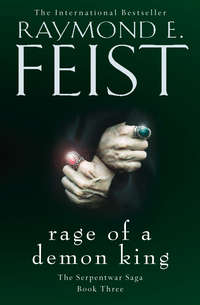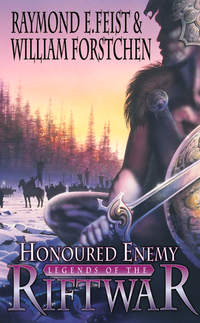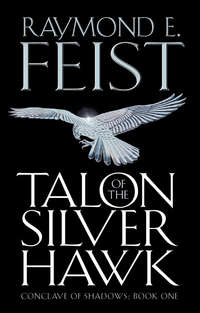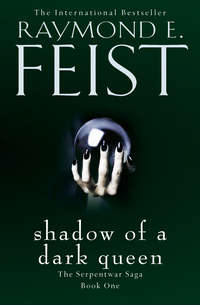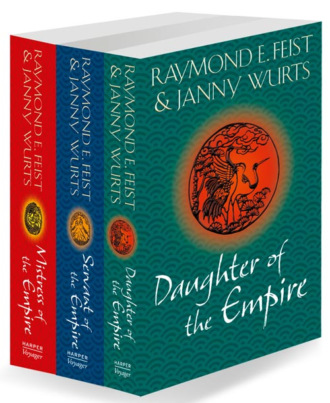
Полная версия
The Complete Empire Trilogy: Daughter of the Empire, Mistress of the Empire, Servant of the Empire
Arakasi stiffened, startled, and Keyoke froze with his hand half-raised to rub his chin. The request was presumptuous; neither man guessed how the cho-ja might react. For a moment each warrior held his breath, while the cho-ja stood trembling in the same manner as the young warrior who had been poised to attack them only a short while before.
But Lax’l proved uncertain rather than angry. ‘Lady Queen, no human has asked such a thing in our memory. Wait here, and I shall enquire.’ He whirled and scuttled into the hive.
Slowly Keyoke lowered his arm. ‘That was a dangerous move, mistress. If the queen should receive your request with displeasure, your warriors are outnumbered two hundred to one.’
‘And yet the cho-ja officer did not act affronted,’ Arakasi pointed out, ‘merely astonished.’ He shook his head with what might have been admiration.
Nevertheless, Keyoke kept his soldiers on guard. With weapons near to hand, all waited for the cho-ja commander’s return.
Lax’l scuttled abruptly from the dark beyond the entrance. He bowed low, the polished dome of his head segment almost brushing the dust. ‘Our queen is honoured that you are willing to visit the heart of the hive to see her daughter. She will allow you to enter with one officer, five soldiers, and as many workers as you need. Lady of the Acoma, come at once, for my Queen waits to greet you within the great chamber.’
Mara signalled through the hangings and a somewhat bemused Keyoke chose Arakasi and four others to follow Lax’l. Then the Force Commander ordered the remaining guards to take their ease while their mistress was absent. In short order, Mara, her picked attendants, and her guards entered the hillside, immediately engulfed by the gloom of the tunnel.
Mara’s first impression was of moist, earth odours, and of another scent intermingled, a nutty, spicy smell that could only be the cho-ja. The large arch they passed under was faced with carvings of surpassing delicacy, decorated with precious inlays of metal and gems. Mara imagined Jican’s exclamations of delight should the Acoma estate gain craftsmen capable of such work. Then the shadows deepened as the tunnel sloped downwards, out of the direct light of the entrance. Behind gauzy curtains, Mara was virtually blind until her eyes adjusted to the darkness. The cho-ja Force Commander scuttled ahead with the quickness characteristic of his race. The humans walked briskly to keep up, the panting of the slaves strangely amplified as they bore the litter down a maze-like array of ramps. The tunnels had been hewed out of the ground, then braced with some strange compound that set into the hardness of stone. Sounds echoed easily off this substance, lending an eerie quality to the creak of armour and weaponry. Deeper the party marched, through curves that undulated apparently without pattern. Odd globes of light had been placed at junctions, causing intersections to be islands of illumination between long stretches of gloom. Mara studied the globes, amazed to find they contained neither oil nor flame. She wondered how such a glow might be fashioned, even as her litter was jostled by a constant press of cho-ja intent upon hive business. Most turned to regard the humans a moment before continuing on.
As the third intersection disappeared behind, Mara pondered the different cho-ja in her view. Warriors seemed uniformly powerful, with huge lower thorax, broad shoulders on the upper body, and a height half again as tall as the tallest Tsurani. The workers were noticeably shorter and stockier, more placid in their demeanour. But she had seen others, more agile than the workers, yet less formidable than the warriors. When she asked Arakasi about these, he answered, ‘Artisans, mistress.’
The way steepened as they descended into the hive. Intersections became more frequent and the cho-ja scent thickened in the air. In time the passage widened, opening out into a large cavern hung with many light globes. Mara pushed the curtains of her litter wide and stared in surprise and wonder. Clinging to the ceiling of each tunnel into the chamber were small cho-ja, about the size of a human child of five. Transparent wings upon their backs beat furiously, the movement a blur in the dim light. Each creature seemed to rest for a minute or two, then resume the beating for an equal amount of time. The constant changing caused the air to hum with almost musical shifts in rhythm. Arakasi noticed Mara’s amazement and explained. ‘These must be worker females.’
‘I thought you said you knew only of the males,’ commented Mara.
‘I’ve never seen these before,’ he acknowledged. ‘But only the females have wings.’
Lax’l revealed unexpectedly keen hearing as he glanced back at Mara and her escort. ‘Your adviser is correct, Lady Queen. These you see above are sterile females; they are nearly mindless and live only to move through the air through the deep tunnels and chambers. It would grow difficult to breathe down here if not for their labour.’ He guided the Acoma party swiftly across the cavern, turned a bend, and entered a low passage, which quickly became a ramp heading downward. The slaves carrying Mara’s litter struggled for breath. Mara considered calling an early shift change; but the tunnel suddenly opened out into what could only be the Queen’s chamber.
The cho-ja Queen was immense, at least thirty feet long from her head to the end of her second thorax. Dark, almost polished black, she lay upon a raised mound of earth, and from the withered appearance of her legs Mara realized she never moved from that location. Fine hangings draped portions of her anatomy, and between them her workers darted, preening her enormous body, attending diligently to her every comfort and need. High above her, and mounted back upon her thorax, a stocky male perched, his soldier-like body surmounted by the small head of a worker. He rocked over the Queen with a rhythmic motion. Arakasi inclined his head and said, ‘A breeding male, my Lady. One is always with the Queen.’ A dozen cho-ja males were arrayed before her, some with crested helms and others without visible ornament; all awaited the arrival of the Acoma party in polite silence. On either side of the chamber, smaller versions of the Queen lay upon their stomachs, and attendants bustled about each of them. Arakasi pointed these out to Mara and murmured, ‘Rirari, I expect, the lesser queens who lay the eggs.’
Lax’l indicated that they should wait, then scuttled forward with a loud series of clicks. A hush fell over the chamber, though the workers still attended to their tasks. The bearers placed Mara’s litter upon the earth, and with Keyoke’s assistance she stepped forth. No longer hidden by gauze hangings, she felt small, almost lost, in a chamber at least four times the size of the grand hall of the Anasati; up close, the size of the Queen was overpowering. Maintaining her poise with an effort of will, Mara stood while a slave from her retinue slipped a jewelled overrobe over her shoulders. She strove not to quail as the alien Queen stared intently at her. The dark, faceted eyes reflected no expression. Mara endured with an outward show of calm, though her knees began to tremble as her attendant stepped back. Then the cho-ja Queen spoke in a voice surprisingly slight and delicate to be issuing from so enormous a form. ‘You are the human Queen?’
Mara bowed slightly, the jewels on her sleeves flashing in the dim light. ‘I am Mara, Ruling Lady of the Acoma. We have no queens as you do, but I rule my house in the same manner as you would your hive.’
The Queen made a sound. Her chitin features remained immobile, but her manner suggested amusement, and her outburst seemed akin to human laughter.
‘I didn’t expect your kind to breed like us, Mara of the Acoma. I have been told of your odd matings. I am very old. But among humans I have heard only of Ruling Lords. How is it that you hold command, and the men who accompany you do not?’
Mara explained that only when no male heirs remained within a noble family did a female come to power. The Queen listened, and when Mara finished, said, ‘You humans are so alien. We often wonder what makes you strive so. But I distract myself. The new Queen, my daughter, is anxious to meet a human queen, particularly one who ventures below ground in deference to the customs of our kind.’
Now the old Queen sang out in a loud, piping whistle, and a pair of cho-ja workers came forward. Between them they ushered a cho-ja smaller than any the human party had encountered so far. Mara looked a long moment before she understood. ‘This is the new Queen?’
‘Such was I once, long ago. She will grow and within a matter of weeks she will be big enough to rule; a few months after, she will start reproduction.’
The young Queen regarded Mara, circling her to get a better look. She seemed to move with a grace not seen in any cho-ja before, her steps fluid, even lithe; she showed none of the rapid movement Mara had observed in the workers and soldiers. But even as she spoke in the clicking tongue of her kind, her bright, faceted eyes never left Mara. The cho-ja matriarch said, ‘Our young are born knowing our language, as they are taught while they grow within the egg sac. Your tongue they must learn after they hatch. My daughter will be unable to speak with you for some time yet to come.’
The young Queen’s scrutiny made Mara’s skin prickle self-consciously; yet she held still and waited. Presently the young Queen finished her inspection and fell silent. The old Queen answered rapidly and then translated in Tsurani. ‘She said you are all alien-looking – frightening.’ To Mara she added, ‘Though you are less frightening that the males.’
Mara bowed slightly to the new Queen. ‘Please tell her I think she is lovely.’ The remark was not empty flattery; although the young Queen would someday grow to be the monstrous equal of her mother, at present she was delicately formed and pleasing to observe. Unlike the blue-tinged males, she was a deep maroon in colour and possessed a quality that Mara could only call feminine.
The old Queen interpreted and the new Queen trilled, seemingly in pleasure. Mara went on, ‘We come seeking a treaty. We would welcome this new Queen and her followers to build a hive on our land. We would like to begin negotiations as soon as possible.’
The old Queen answered, ‘I do not understand. The negotiations have begun.’
Mara felt a stab of concern. The finality of the event came too suddenly for her to cope, for she had banked upon the counsel of Arakasi. She strove politely to buy time. ‘I am weary from days of travel. Might I have leave to rest a day before we speak of these matters?’
The old Queen repeated the request and followed with the young Queen’s answer. ‘My daughter Queen says she will hear what you bid, now.’
Mara looked at Arakasi, who whispered, ‘If you leave, you may offend her and lose any chance to speak to her again.’
Suddenly Mara felt worn. The excitement of reaching the hive had buoyed her for the last hour, but now she felt ready to collapse. The stress of dealing with the young Queen combined with the killing pace of the last week made her mind seem fog-clouded. Still, there seemed no choice but to go on. Mara signalled for a cushion from her litter to be placed upon the floor. She seated herself as formally as she could manage and opened negotiations. ‘What would your daughter wish to come live upon Acoma lands?’
The young Queen crouched cho-ja fashion, by lowering her four legs in a squat while maintaining an erect upper torso, arms crossed in very human fashion. She fixed large eyes upon Mara and spoke. The old Queen translated. ‘My daughter wishes to know if the earth of your estates is wet or dry.’
Mara answered without hesitation. ‘Both. The Acoma lands are wide and rich, from water-flooded thyza paddies to high forests. We have meadowlands which rise up into hills not unlike those that surround this hive.’
The young Queen listened to her mother’s interpretation, then responded. ‘My daughter Queen would settle her following near clean water, but not where the ground is too wet. She asks also that the place be away from the forest, as the old root systems make digging the upper tunnels difficult. The first chamber must be dug quickly, for she would not risk staying above ground any longer than necessary.’
Mara conferred with Keyoke. ‘We could give her the lower needra meadow to the west of the river. Slaves can then clear new land for the herd to the east.’ When the Force Commander nodded agreement, Mara said, ‘Tell your daughter that we offer a low hill of land, surrounded by open meadow, within a short march to fresh, clear water. But the land is located above the higher of the two banks of the river and stays dry, even during the heavy rains.’
The old Queen and the young engaged in discussion. The cho-ja language of clicks and whistles seemed more efficient than human words; or else the aliens exchanged information in ways that supplemented language. Mara waited, inwardly nervous.
Suddenly a strident whistle echoed through the hive’s great chamber. Mara’s retinue stiffened in alarm, and the old Queen’s conversation with her daughter ceased abruptly. Fearful the disturbance might herald alarm, Keyoke gripped his sword hilt.
But Arakasi seized the Force Commander’s upper arm and whispered urgently, ‘Pull steel this close to two queens and we all die instantly.’ The older Queen showed no sign of alarm, but the males near her had all risen to a half crouch, a battle posture that readied them to explode into a charge. Half-raised forearms quivered slightly as razor-sharp chitin ridges were angled towards Keyoke. The old Force Commander had seen cho-ja at war; these were a hairsbreadth away from attack. He released his sword and at once the warriors before the old Queen subsided into their squatting position. The old Queen made no comment. Arakasi released a pent-up breath and offered slight reassurance. ‘Should danger arise, those warriors will protect us as well as their Queen.’ Keyoke nodded at the logic of this, but he still stepped closer to his Lady.
On the dais, the old Queen clicked and twitched a forelimb; and in response to her command, Lax’l rose from his place at her feet and scuttled off.
Watching him, Mara wondered whether she could ever adjust to the speed at which the cho-ja moved at need. As messengers, they would be unparalleled, and that prompted remembrance of a childhood rhyme recited by Nacoya that ended ‘… the cho-ja are the first with news and early-season fruit.’ Phrased as nonsense, and treated by humans as entertainment for youngsters, Mara pondered now whether the jingle held some element of truth.
Lax’l returned before she could pursue the idea with inquiry. He exchanged rapid whistles and clicks with his matriarch; and the old Queen’s next words banished all musings upon nursery tales from Mara’s thoughts.
‘Lady Queen of the Acoma,’ the ruling cho-ja said, ‘word arrives that a Lord of your kind has travelled to the hive to bargain against you for the new Queen’s favour.’
• Chapter Six • Ceremony
Mara stiffened.
Dismay, disappointment, and anger welled up within her all at once; then fear prevailed over all else. Somehow, someone had relayed word of the cho-ja Queen’s hatching.
If the news had spread indiscriminately across the countryside, more than one family might be travelling to the hive in the hill. The one waiting above would be only the first of many. Yet this boded ill even if the news had not been widely dispersed, for then the Lord of the Inrodaka might have invited some special friend to be first to seek the new Queen’s hive. He would most certainly not be pleased to discover trespassers upon his land to steal a march upon his ally. With or without the young Queen’s approval, Mara now faced returning across the lands of a hostile Lord aware of her presence. Even more frightening, some agent of the Minwanabi might have learned of Mara’s errand and sent an informant back to his master. Perhaps Jingu himself waited above to communicate with the young Queen.
Careful to hide her distress from the Queens, Mara took a deep breath. Her throat felt as dry as sand, even as she reminded herself of a teaching mother’s lesson: ‘Fear is the little death, daughter. It kills in tiny pieces.’
With the appearance of calm, Mara looked to the old Queen. ‘Honoured ruler,’ she said, ‘be advised that I am most determined to win the loyalty of this new hive. Acoma lands are rich and wide, and another Lord of the Empire is unlikely to better the terms I can offer.’
On the dais, the old Queen huffed through her nose slits, the cho-ja equivalent of laughter. ‘Loyalty? Lady Ruler of the Acoma, that is a concept not shared by my kind. Workers, warriors, rirari, all do as is their nature, for without the hive there is nothing. A queen is the sole arbiter of a hive, and we make our trade contracts for the best terms we may. Always we serve the highest bidder.’
Mara sat speechless at this revelation. By chance the Queen had disclosed a thing no Tsurani in the Empire had guessed. Tsurani society had always believed the cho-ja were above certain human failings. Now what was believed to be an unassailable sense of honour was revealed as the crassest sort of service-mongering. These cho-ja were nothing more than a race of merchants. Their legendary loyalty was open to sale to the highest bidder, and perhaps subject to renegotiation should the cho-ja receive a better offer from a rival Lord. One of the underpinnings of the Empire’s power structure was far more vulnerable than anyone knew, for never before had anyone thought to test cho-ja loyalty by contacting the hive upon another Lord’s lands. Through her dismay, Mara saw advantage: so long as no other ruler in the Empire guessed the truth, she might use such knowledge for her own gain – provided she survived the next hour.
‘Keyoke.’ Mara leaned across her cushions and motioned the Force Commander closer. ‘These warriors who came with us must be sworn to absolute silence.’ With her face kept carefully blank, she added, ‘The slaves must not be permitted to reveal what we have just heard.’ Nothing more would be said, but the old warrior knew she had just pronounced death sentence upon eight men. He in turn whispered something to Arakasi and, his expression unreadable, the Spy Master nodded once, indicating he affirmed the decision.
Mara straightened. To the old Queen she said, ‘Then we shall bargain.’
Excited by the prospect, the old Queen trilled her pleasure. ‘I shall inform the other human Lord that he has a competing offer.’
The Queen then issued commands to waiting cho-ja workers. These were of the smaller, more intelligent artisan class. Mara waited with the appearance of patience as they scuttled away. Other workers entered the chamber, clearly establishing a relay of messengers, since the newly arrived Lord preferred to negotiate from the surface, in the traditional Tsurani manner. Mara resolved to extract what advantage she could from that circumstance.
The first message arrived from above, and after clicking communication with the courier and the young Queen, the hive matriarch inclined her head towards Mara. ‘Your rival Lord also possesses fine meadowlands that are dry year round, near to good water, and free of tree roots. He says as well that his soil is sandy and easy to tunnel.’ She paused and conferred with her daughter Queen, then added, ‘Lady of the Acoma, my hatchling wishes to know if you care to improve your offer.’
Mara resisted an impulse to twist her fingers in the fringes of her cushion. ‘Kindly relate to your daughter that sandy soil may be easy to dig, but it also leaches water and tends to collapse easily.’
Enjoying herself, the old Queen responded with her odd laugh. ‘We know, Lady of the Acoma. We find it entertaining that a human would presume to know more of tunnelling than a cho-ja. Still, sandy soil presents no difficult problem for us.’
Mara thought quickly. ‘You are the finest miners in the world, yet I will provide slaves to help with the digging so that your daughter’s wait upon the surface is short. One hundred of my warriors will safeguard the site, and my own pavilion will shade her from the sun until her chambers are ready underground.’ Mara swallowed hard. ‘In addition, each day she remains above ground she shall have twenty baskets of fruits and thyza harvested from my fields, that her workers may remain full of industry with no need to forage.’
The old Queen clicked her translation and the young Queen replied. A moment later a messenger scuttled up the passage towards the surface. Perspiring lightly in the spicy warmth, Mara managed not to fidget. Negotiations might proceed very slowly, she thought, but the messenger returned unexpectedly fast.
When the new terms had been related to her daughter, the old Queen translated for Mara. ‘Should any tunnels collapse, your rival says he offers a suite of rooms in his estate house to the Queen and her chosen attendants, until her own quarters may be rebuilt.’
Something in the Queen’s voice lent Mara an insight. Despite her fluent Tsurani, the Queen was an alien being with alien needs. Few common values overlapped; by repeating the rival offer, the cho-ja ruler might not be indicating her preference but instead inciting the human rulers to bid each other up as high as possible. Mara strove to be as shrewd as possible. ‘That is silly. What reason would your daughter have to wish to reside in a Tsurani house? My pavilion would be more comfortable.’
The old Queen answered without hesitation. ‘This is true. But he also offers a hundredweight in jade and an equal weight in fine metal to endow my daughter’s craft workers.’
Mara shivered slightly under her thin robes. The items just named amounted to a fortune. Her rival above was most determined, to raise his stakes so high this soon. Cleverness alone would not suffice, and Mara imagined Jican wringing his hands as she debated the wealth the Acoma would pledge as a counter-offer.
Mara’s voice was unsteady as she spoke. ‘Honourable Queen, tell your daughter that Tsurani estate houses are suitable to workers and soldiers only, not queens. Far better, tunnels that never collapse. Say also that metals and jade are useless without tools to work them; so then, what would the cho-ja wish: gems and metals which they can find more easily than any human miner, or tools which can work such into things of beauty and value, to be traded to humans for whatever the cho-ja truly wish to possess? I will match the other Lord’s offer in value, but with things cho-ja do not fashion for themselves: tools, and needra hide of equal worth, and resin-worked woods.’ She paused, then added, ‘Also weapons and armour for her warriors.’
‘A generous offer,’ observed the old Queen. Her eyes glittered brightly while she translated as if she enjoyed the striving between human rulers. The exchange was punctuated by excited trills.
Strained and tired, Mara closed her eyes. The Acoma resources stood in danger of depletion, and the pledge she had just made relied heavily on the craftsmen brought in by Lujan, armourers and weapons makers whose work had yet to be evaluated. And the cho-ja would be insulted by inferior work, perhaps even moved to wrath.
The messenger returned quickly. He exchanged rapid clicks with the Queen matriarch, and the daughter Queen broke into a series of loud trills.
Mara dreaded the translation; surely the outburst from the daughter Queen signified a magnanimous concession from the rival Lord.
The old Queen finished with the messenger. Still as a statue of obsidian, she said, ‘Lady Ruler, the Lord above ground has informed us that he recognizes Acoma colours upon the warriors who wait by the hive entrance. He says he knows of your resources and claims further that you cannot possibly meet the terms you have just named.’
Mara’s eyes narrowed before the glittering gaze of the Queen. ‘His words are untrue.’ She paused, contained a sharp, dangerous anger, and arose from her cushion. ‘This Lord speaks from ignorance.’
Indifferent to Mara’s ire, the Queen said, ‘I do not understand.’


